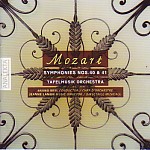These are very fine performances, characteristic of the best of what the period-instrument movement has to offer in this music. Tempos are lively, rhythms are clean, and the playing is excellent. This brings a big dose of nervous energy to the first movement and minuet of Symphony No. 40, and an apt suggestion of anger to its finale. In the “Jupiter” Symphony the contrapuntal intricacies of the finale seldom have been laid out so clearly, or joyously. The final, multi-theme pile-up in the coda is magnificent, with the horns resounding and everyone playing their hearts out.
I’m less persuaded by the string sound (minimal vibrato?) in the slow movements, and the resultant thin sonority; yes, vibrato may have been regarded as an “ornament”, but if ever there was a place for it, then this is it. Anyway, that’s part of the period-performance package these days, and at least in these performances the benefits far outweigh the disadvantages. These may not be the most distinctive versions around interpretively speaking; they are very much “of their type”. But if you like that type then this very well-recorded disc will make you happy indeed.
































